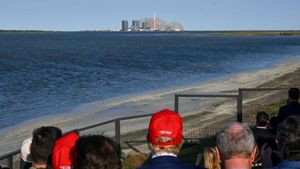Concerns about the possibility of a new transatlantic trade war are heating up, especially with the recent election of Donald Trump as the President of the United States. His known penchant for aggressive trade policies has left Europe apprehensive about future tariffs and their economic consequences.
Since the U.S. elections, the euro has been on a downward spiral, dropping below $1.04 against the dollar, the lowest since November 2022. Analysts have raised alarms about the euro potentially reaching parity with the dollar, which could spell trouble for economies already grappling with recessionary fears. This decline is linked to Trump's promise to impose tariffs on European imports, which could undermine the eurozone economy significantly.
Trump's trade war strategies are nothing new. He previously threatened to impose hefty tariffs on imports from China and other countries, impacting global trade dynamics. Now, as he returns to power, similar threats loom over Europe, with expectations of tariffs of 10% or even higher on EU goods. Such moves would likely decrease the competitiveness of European exports, potentially stalling economic growth across the continent.
According to Deutsche Bank's analysis, the financial markets have yet to fully factor in the consequences of Trump's anticipated policies. George Saravelos, a prominent analyst, asserted, "The bottom line is the market is still not pricing a lot of Trump." He believes the euro could witness drastic declines if the punitive trade measures are enacted.
Further complicative factors are the potential changes to immigration policies and fiscal spending, which would also add to the economic uncertainty. The combination of these factors could lead the euro to slip even more, with predictions estimating it might hit parity with the dollar by 2025.
Business sentiment across Europe is already impacted by these developments. Reports indicate a decline in the business climate index, with the latest figures reflecting diminishing confidence among companies. This anxiety has been particularly pronounced among Germany's industrial sectors, which have historically been strong yet now appear vulnerable against the backdrop of increasing trade tensions.
French central bank governor Francois Villeroy de Galhau echoed these concerns, highlighting the risks posed not just at the national level but also for the global economy. He warned of "more inflation—especially in the U.S., more financial volatility, less trade and hence less growth, including for Europe."">
The European Central Bank (ECB) is urging the EU to push forward with long-shelved economic integration projects, seeing urgent completion as necessary to mitigate the impending threat of trade wars. ECB President Christine Lagarde pointed out the need for greater capital market union and banking union—which could channel resources more efficiently and leverage larger financial enterprises.
Instead of allowing funds to drift aimlessly or leaving the eurozone for potentially more lucrative markets, Lagarde proposes mechanisms to create and maintain local investments. "If EU households were to align their deposit-to-financial assets ratios with those of U.S. households," she noted, "up to 8 trillion euros could be redirected to long-term market investments. This flow could be around 350 billion euros annually."
This drive for integration could become more pertinent should tariffs be implemented, directly impacting European firms' ability to compete globally. The ECB has indicated the urgency of reducing investment costs and streamlining regulations to enable more effective funding routes.
The stakes heighten when considering geopolitical consequences as well. Europe faces not just economic pressure but potential backlash from adjusting its trade policies. For example, if Europe adopts aggressive tariffs against China, retaliation could ensue, prompting severe repercussions such as reduced agricultural imports or even military support to Russia, exacerbated by the current geopolitical climate.
Ominous forecasts predict the return of Trump’s tariffs could propagate inflationary pressures, prompting the ECB to cut interest rates to stave off recession, yet simultaneously witnessing the U.S. Federal Reserve resisting similar measures amid high inflation. This divergence could lead to increasing interest rates for the dollar paired with decreasing rates for the euro, likely intensifying the disparity between the two currencies.
With mounting commercial tensions and economic uncertainty on both sides of the Atlantic, the prospect of trade and currency volatility only elevates. Recent forecasts suggest continued erosion of business confidence as firms face the prospect of steep tariffs and regulatory disruptions.
Germany's economic performance, traditionally regarded as stable, is now under scrutiny. Economic indicators reveal stagnation, casting doubt on whether it can recover as the spokesperson for the eurozone. Politically and economically, Germany is at the mercy of outside influences, particularly from the U.S. trade stance and potential economic fallout.
It's clear the economic chessboard is shifting. While European leaders call for unity and strength against potential tariffs, the reality of their economic vulnerabilities is more pronounced than ever. With the unpredictable elements of U.S. trade policy looming large, Europe must navigate these treacherous waters carefully, prioritizing structural economic integration as they brace for potential fallout.



